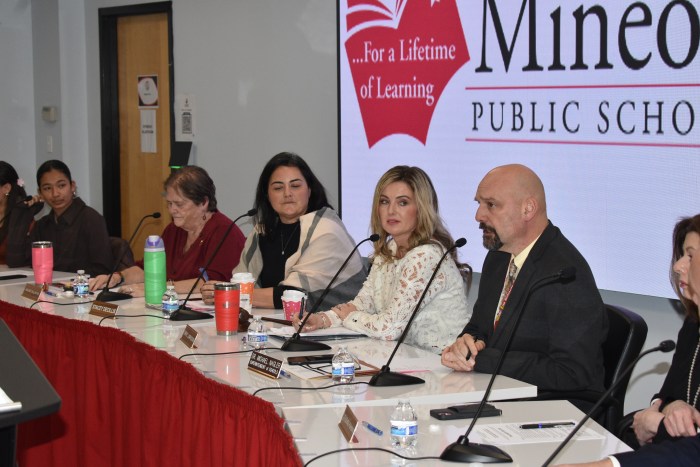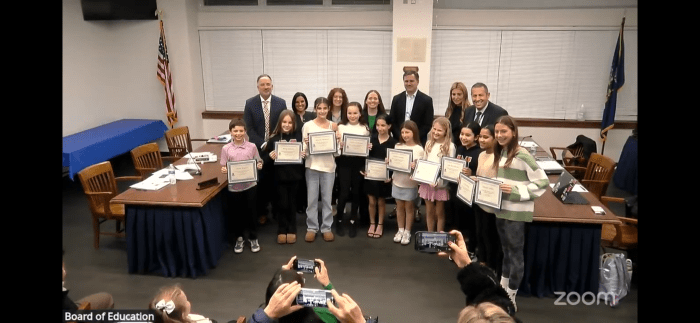By Jennifer Corr
At the Jericho Union Free School District Board of Education meeting in May, there was much discussion around a policy called Diversity, Equity and Inclusion (DEI).
The DEI policy was launched by The board of regents to advance diversity, equity and inclusion in schools across the New York State. The board of regents stated on its website that it expects all school districts to develop policies that advance diversity, equity and inclusion–and that they implement such policies with fidelity and urgency.
The Board of Regents DEI framework and policy statement is as follows:
“At the board of regents meeting in April 2021, the board discussed a framework on Diversity, Equity and Inclusion for New York State Schools which served as the basis for adopting a policy statement. At the May 2021 meeting of the board, they will discuss and act on the proposed policy statement. The policy of the New York State Board of Regents is to encourage and support efforts at the state and local level to create within every school an ecosystem of success that is built upon a foundation of diversity, equity, inclusion, access, opportunity, innovation, confidence, trust, respect, caring, and relationship-building. All students must feel that they are welcome, they belong, and they are supported in every school. The board of regents recognizes that much of this work is already happening in districts all across the state. School and district leaders, teachers, staff, students, and parents are working to create school communities that are more diverse, more equitable, and more inclusive than ever before. Many of New York’s education stakeholders and their organizations have prioritized this issue, and their efforts must be recognized and applauded. But more work remains, and the board of regents and the State Education Department are committed to supporting schools and districts in their efforts to lift up all students.”
During the public comment portion of the May 19 meeting, a pair of parents and a student stepped up to the podium to express their thoughts about the policy.
A parent, who did not state her name before speaking during public comment, said “I couldn’t agree more [with The Board of Regents policy] and support having a DEI policy in Jericho. DEI is not a radical way of thinking that will transform our children into social justice warriors. The purpose of having a DEI policy is having a safe, nurturing learning environment for all students.”
She added that when a board of education adopts a DEI policy, they’re committed to ensure that all students will have educational opportunities and the resources they need to succeed. She then said she wants to have the policy in place for her daughters.
Another parent named Joe Lin asked the board of education about their process for forming a DEI Committee, and if they were committed to selecting members of the committee with DEI-related experiences so that the policy isn’t just a “theoretical exercise.”
“At the very beginning of COVID-19, we had several staff members attend some DEI training sessions at Columbia University and they were trained and they received training by participating in DEI development and activities,” Jericho Union Free School District Superintendent Henry L. Grishman said. “They will all three be on the committee. There will be representation from our community, from our faculty and staff and board of education. There will be a cross section of the DEI Committee with staff members and community members who have expressed interest in working on a DEI Committee.”
Allie McCormick, a junior at Jericho High School, expressed concern that the topic of teaching about diversity, equity and inclusion in classrooms is up for debate.
“When I first heard of this news, I was, to say the least, shocked,” she said. “Teaching about DEI in classrooms allows students to have a grasp on history when teaching about certain events and helps us to grow as a society. If pressing topics like race are not spoken about within the classrooms, taught to an appropriate age level, progressions in society will never be made.”
After public comment, the board of education moved to accept the first reading of the DEI policy, making small revisions and updates like not using faculty member’s names in the policy. At a prior meeting, Board of Education President Jill Citron said, the board voted to table the DEI Policy because they all agreed the then one-page policy didn’t have enough substance to it.
Board trustee Dr. Divya Balachandar brought up a question that many parents were asking about the policy in regards to taking “…creative steps to enhance the level of socio-economic and racial diversity in districts, schools.”
“I love the idea,” Balachandar said. “I just don’t know how practically we would be doing that.”
Grishman said that exact topic was discussed in Central Office, and that trying to define what it would mean for the district was challenging. He recommended taking that part of the policy out. Citron agreed.
The board of regents asked all districts to create their own DEI policies, but left districts room to create a policy that would be unique to their district.
The vice president of the Board of Education, Dr. Pam Wasserman-Heath, said that as her term expires, she embraces the DEI policy and its importance to the district and its students.
Board trustee Sam Perlman expressed concern that the DEI policy was being rushed, and that often DEI policies address employment and not curriculum.
Perlman also brought up a policy item that discusses eliminating the use of terms and phrases that perpetuate stereotypes and limits student’s opportunities. Perlman asked how the districts would eliminate it and if Dr. Eric Sundberg, the curriculum associate for social studies, business and libraries, would have to become the “vocabulary police” and if violations could become punishable.
Citron clarified that the terms and phrases portion of the policy was a goal, not a punishment.
Perlman expressed fear that this portion of the policy could lead to extreme division.
“I am in favor of developing a DEI policy,” Perlman said. “But we are the Jericho School District. I hear 100 times that everybody tells me, we’re the leaders. Everybody follows us. We are taking a boiler plate, off the rack policy that clearly has many, many parts that do not apply to the Jericho School District. We already eliminated two [policy items]. Why is it we are eliminating them here while we are sitting in this meeting. Why wasn’t this done by our administration? Our council? Our DEI Committee?”
Grishman reminded Perlman that it wasn’t the first time the board of education made revisions to a policy during the first reading.
“…This is a very new concept in the world today,” trustee Jennifer Vartanov said. “It did not exist a few years back, it’s something that came about due to the political climate. But if we are going to work towards a successful DEI policy, I think that we need to have a conversation as a board, but also I believe that the DEI committee would be necessary to talk about the ideas and put something on paper and not take something that’s boiler plate and start chopping it up. Obviously this is a five-page policy. We can sit here all night chopping it up, but I don’t think that’s fair to the board or fair to the community.”
If the board of education is going to be using tax-payer dollars to implement the policies, Vartanov added, then the policy needs to be more specific.
“I would like to understand what lacks in the Jericho School District, because from what I know and what I hear, we are the best,” Vartanov said. “I didn’t know we lacked in some shape or form or that we were not inclusive. But if we feel it’s important, lets talk about the specifics of what should be included. I don’t think we should be doing the first reading tonight.”
Perlman echoed Vartanov’s point, saying that Jericho provides everything needed for students from pencils to laptops, and that there isn’t an equity issue in Jericho.
Dr. Wasserman-Heath said she does not feel the policy is “boiler plate,” but rather a solid policy filled with good ideas. Grishman added that 90 percent of the policies the district has adopted throughout the years has been developed by a policy service from BOCES.
Citron said the board of education is not responsible for writing the specifics of the policy, rather the administration is. It is the board’s job to set forth aspirations, she said.
“We’re clearly not accepting the first reading tonight, but this is the opportunity to make more changes,” Citron said.
Through the meeting, Perlman went through the policy, asking questions about the various portions within it, arguing that the DEI policy should be broken up into two facets: employment and curriculum.
Citron asked Perlam to send all his comments to the board of education, stating that the policy will be discussed at the next meeting.































